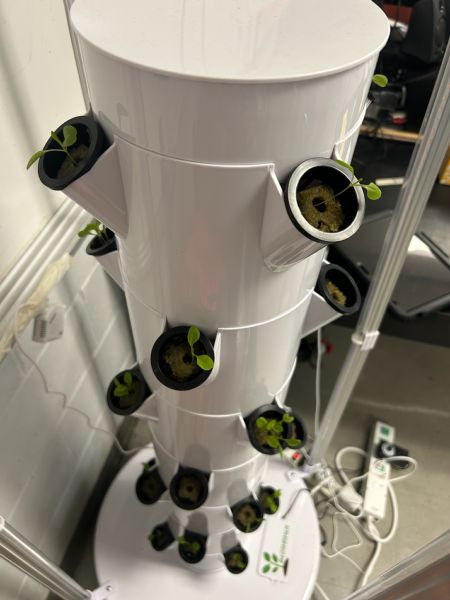
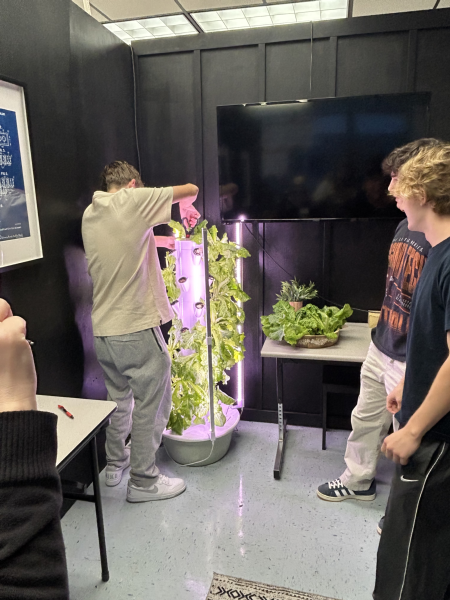
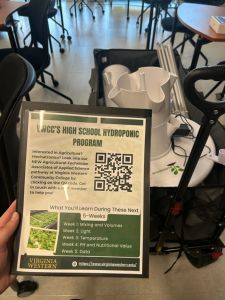
It is impossible to summarize how much our project has benefited from the drive and insights of Cynthia Fairbanks. Her unwavering commitment, strategic thinking, and ability to anticipate challenges before they arise have been instrumental in shaping our direction and accelerating our progress. Cynthia brings a rare combination of vision and pragmatism—she not only sees the big picture but also dives into the details with precision and purpose. We are going to miss her dearly but wish her the best in her new exciting role in extension. Best of luck!!

Assistant Professor and Extension Specialist in CEA with Virginia Tech's School of Plant and Environmental Sciences has agreed to serve on the CP2 Business and Industry Leadership Team.
Dr. South is based in Danville, VA at the Institute of Advanced Learning and Research. https://www.ialr.org/staff/kaylee-south/. We are very thankful to Dr. South for agreeing to help us moving forward. She is welcome addition to our group and her inclusion strengthens our ties with the IALR and their CEA efforts in the southern part of Virginia.
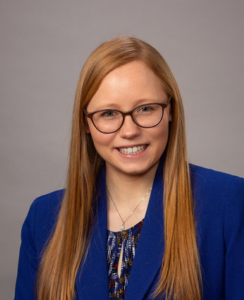
Heather Fay is not only a new BILT member but also relatively new to her role as Director of the Greater Roanoke and New River Valley Small Business Development Center. Earlier this year, she played a key role in organizing Virginia Western Community College’s inaugural Agripolooza event, which was a tremendous success. We’re already looking forward to Agripolooza 2 in 2026! Heather is deeply invested in the Roanoke small business community, and we’re fortunate to have her strong voice guiding our future ATE initiatives.

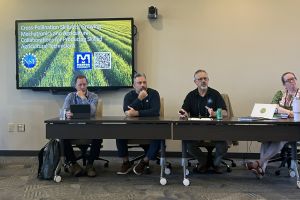
David Berry and Cynthia Fairbanks attended CEA Summit East 2025 presented by Indoor Ag-Con in Danville, Virginia at IALR (Institute for Advanced Learning and Research). David presented in a breakout session at the summit categorized "Behind the Scenes Look at Successful CEA-Related Degree Programs." He talked about the Ag-Tech's grants progress, initiatives, and high school outreach programs we are involved in. Pictured is David Berry.
The project will advance the understanding of modern mechatronics skills, agricultural knowledge, and leadership skills to grow a regional workforce needed to meet the growing field of precision-agriculture. The goal of this project is to develop a novel Ag-Tech career studies certificate (CSC) that can be completed at the community college in just four semesters. The scope of the project will involve current faculty and staff, industry leaders, high school instructors, and current and future Virginia Western Community College students. The project will advance understanding of mechatronics and agricultural skills needed in an Ag-Tech career through field trips to partnering industries and development of new courses through feedback from current BILT leaders. New courses will include vertical growing, autonomous vehicles, and agricultural leadership. This project will add to the field intellectually through development of a novel Ag-Tech CSC that currently does not exist in the VCCS. With the goal of producing 45 graduates, the project will benefit the local economy of Roanoke by generating $3.3 million in direct, indirect, and induced economic impact over 3 years. Evaluation of the project will be performed twice a year through student, faculty, and industry feedback. Annual evaluation activities will analyze number of participants, retention, and satisfaction with the project to determine future direction if feedback indicates changes are needed. The progress and results of the project will be disseminated through ATE Central, internally in the college, with participants at HI-TEC (High Impact Technology Exchange Conference), and potentially in peer-reviewed journals such as Journal of Engineering Technology (JET).
On April 10, 2025, a group of 15 students and 4 staff members participated in a tour of Red Sun Farms in Dublin, Virginia. The visit was guided by Plant Manager Arturro Gomez Mazaten, who provided an overview of the farm's biosecurity protocols and gave us an inside look at their greenhouses which cultivate three distinct tomato varieties. He explained their processes to efficiently harvest and sell tomatoes to major retail stores along the East Coast. During the tour, we saw the bees used for pollination and learned that the farm relies entirely on natural sunlight to support plant growth.
After the field-trip anonymous voluntary surveys were distributed and 2 surveys were completed.
This project aims to serve the national interest by advancing workforce readiness of agricultural technicians. Agriculture is a top economic driver in Virginia. Both the state government and private industry are currently investing in industries focused on hydroponics, precision-agriculture, and controlled-environmental agriculture. This project directly aligns with these initiatives and will develop an agriculture-technology (Ag-Tech) curriculum that teaches skillsets needed by today's technicians. The project will meet the NSF Advanced Technological Education (ATE) program mission by highlighting successful members of the STEM workforce from traditionally underserved groups in STEM and merging two traditionally divided areas of study into one career studies certificate. Specifically, this effort seeks to blend the mechatronics discipline with agriculture disciplines. As no Ag-Tech program currently exists within the Virginia Community College system, the project will serve as a model for those seeking to develop one. The project will play an important role in workforce development by maintaining BILT (Business & Industry Leadership Team) partnerships and using industry feedback to grow the novel Ag-Tech program.
The National Science Foundation's Advanced Technological Education (ATE) program has been funding innovation at two-year colleges for over twenty years. With a focus on the education of technicians for the high-technology fields that drive our nation's economy, and strong partnerships between academic institutions and industry, ATE promotes improvement in the education of science and engineering technicians at the undergraduate and secondary school levels.
To learn more about ATE, please visit the NSF ATE program home page.
In early November, Mallory and Cynthia attended Senior Saturday on campus at VWCC. They had a small hydroponic unit from Crop King that they used as a talking point when advertising the Ag-Tech program to prospective students. They talked about the individual Agriculture and Mechatronics options as well and were able to get students emails to send more information to in Spring 2025 who showed interest in the program.
The second-year IND 250 class, taught by David Berry, requires a final group project based on a small-scale automation process that utilizes a Programmable Logic Controller (PLC) and a combination of analog and digital sensors. Students are assessed on the function of their prototype, schematics, wire management, programmed logic and a formal presentation of their task. In Fall 2024, students were encouraged to use their projects to fulfill a task with an agricultural focus. The result of one team was an automated hydroponics system which received the support of VWCC, the NSF grant, and the students' employer, Steel Dynamics Inc.
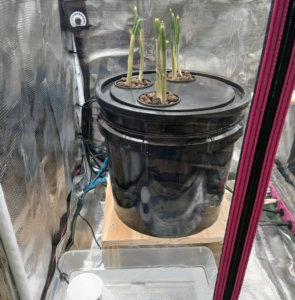
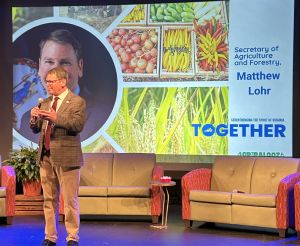
On March 16, 2025 on National Agriculture Day, Virginia SBDC Greater Roanoke and NRV Team partnered with Virginia Western to facilitate an all-day conference to engage engage agriculture business owners and entrepreneurs. The keynote speakers included Secretary of Agriculture, Matt Lohr and Vice President of Applied Research at IALR, Scott Lowman. There were different breakout sessions all day to engage different audiences and interests and provided a great networking opportunity for industry professionals in the Roanoke region. There was a resource fair for businesses to provide tangible resources to attendees and Virginia Western had a table highlighting STEM programs including the new Agriculture CSC.
None scheduled at this time
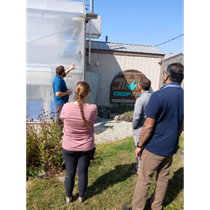
David Berry and Mallory White visited Crop King in Lodi, Ohio in September for a three-day Grower’s Workshop. Crop King is well-known nationally for their hydroponics support systems and greenhouse supplies. The Grower’s Workshop included in-depth discussions on hydroponics systems and controls as well as greenhouse tours of working system for tomatoes, cucumbers and multiple varieties of lettuce. The information on plant health, water quality and troubleshooting was excellent and the opportunity to discuss educational curriculum with industry professionals was priceless.
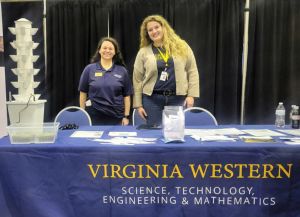
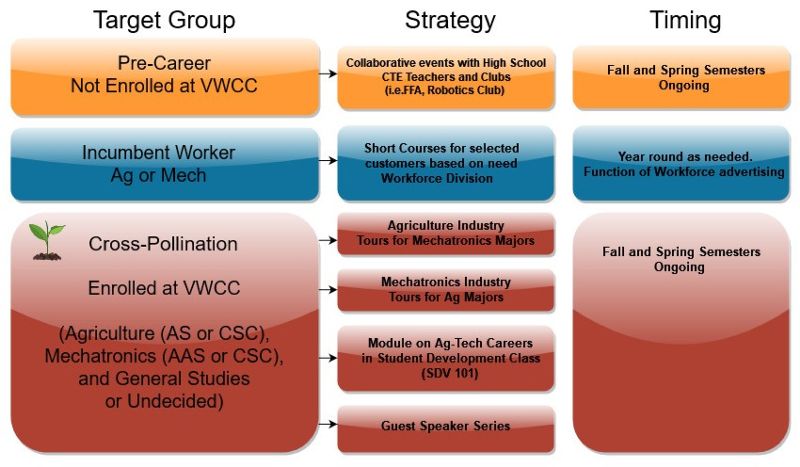
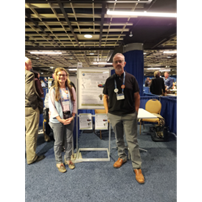
The principal investigators attended the annual PI Conference in October in Washington D.C. Our team prepared a poster for the conversation hub as well as handouts for other interested ATE representatives which prompted multiple interactions with peers in our application space. Pictured is Mallory White (Left) and David Berry (Right).

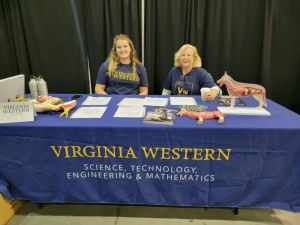
In late September, Mallory and Cynthia attended Career Quest Fall 2024. The event sponsored by the Greater Roanoke Workforce Board is meant to expose 7th and 10th graders to industries in our area. The two-day event normally entertains upwards of 4000 children. Cynthia and Mallory were able to advertise the new Ag-Tech initiative to over 2000 7th grade students over the two-day event. This opportunity also allowed multiple connections with high school teachers and tech-ed instructors who are interested in hosting a hydroponics setup from VWCC in their classrooms. Pictured is Cynthia Fairbanks (Left) and Amy White (Right).
In early September, the Ag-Tech team welcomed Cynthia Fairbanks to our project. Cynthia has a passion for agriculture and education and is already contributing to our forward progression.
Agricultural Technician Assistant
Cynthia Fairbanks: [email protected]
Principal Investigator
David Berry: [email protected]
Co-Principal Investigator
Mallory White: [email protected]
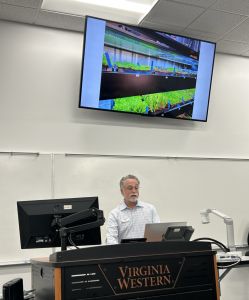
On 4/16/2025 the owner of Fox Urban Farms, based out of Winchester, VA spoke to a group of 29 students and staff about his vertical hydroponic farm. He gave a fantastic presentation on the different varieties of lettuces, microgreens, and edible flowers they produce and explained his business model and how they generate revenue. He transparently explained the costs that arise working with technology and students asked a lot of questions and were very engaged with the speech.
An anonymous voluntary survey was distributed following the speech and 3 students completed the survey. Pictured is John Fox, owner of Fox Urban Farms.
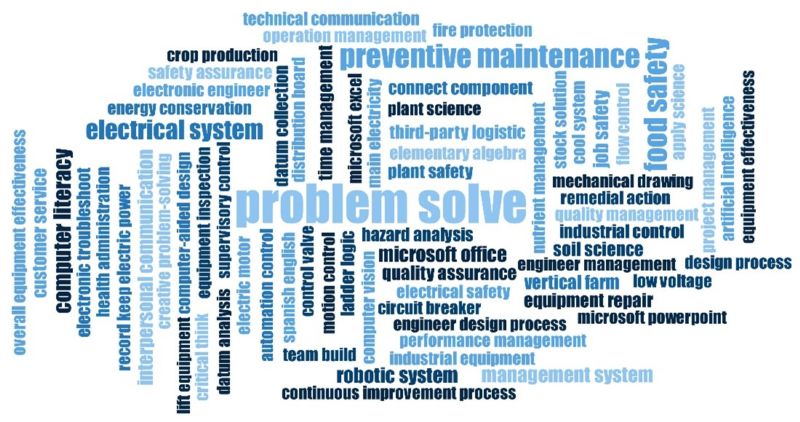
To identify key skills sought after in today’s Agricultural Technician, a wide overview of the current job field on a national level was analyzed to inform the direction of this project. Data were sourced from a collaboration with the Virginia Office of Education Economics (VOEE). The VOEE provided multiple job posting lists from Lightcast Q2 2023 data sets, which sourced 400 job postings nationwide with a crossover between Mechatronics, Food Production, and Agriculture between October 2021 and May 2023. Results listed in the word cloud (Figure 1) are based on Virginia Western’s analysis of the data. This analysis both supports and guides the project goals of developing an Agricultural Technician with applicable skills to both agriculture and mechatronics.
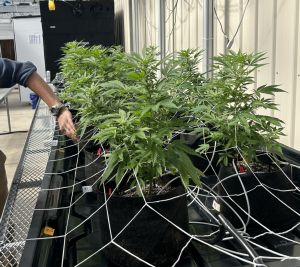
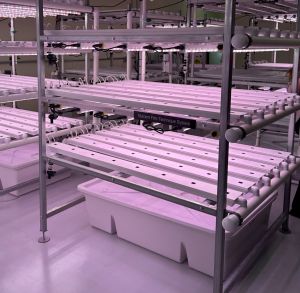
On March 3, 2025 18 students plus 7 staff members attended a tour of IALR in Danville, VA led by Vice President of Applied Research, Scott Lowman. During this tour we were able to see the Controlled Environment Agriculture Innovation Center, view the analytical chemistry classrooms, see the Plant Endophyte Research Center, and witness the advanced robotic imaging they do on plant growth. IALR provides contracted research and testing services to help organizations bring new products to the market or implement testing with cutting-edge technology to ensure quality and safe products.
During our trip we were comfortably transported in a charter bus provided by Abbott Bus Lines and enjoyed a catered lunch by Seasons and Occasions Catering. On the bus ride home anonymous surveys documenting post-tour comprehension were voluntarily implemented and we had 4 students finish the survey.
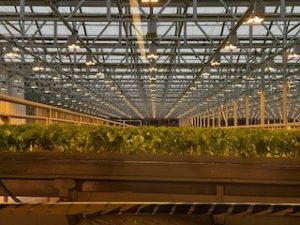
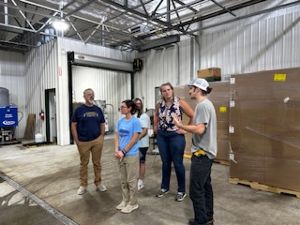
On June 27, 2025 the Ag-Tech team took a trip to Goochland, Virginia to tour Greenswell Growers. We were able to see each segment of their operation and understand their biosecurity practices. Gus Brennan, Head Grower and Director of Operations, and one of our BILT members, led us through his facility. They have multiple products that are in grocery stores including Essential Green Leaf, Refreshing Romaine Blend, Vibrant Greens Blend, and Tender Butter Blend. Pictured is David Berry, Mallory White, Cynthia Fairbanks, and Gus Brennan with photos taken by Amy White.
Virginia and farming have been linked since the first successful settlement at Jamestown. The first Virginians only survived because of their successes with tobacco farming and its trade. (McGill, 2017) The continued success of farming in Virginia makes agriculture Virginia’s largest private industry providing nearly $82.3 billion dollars annually (T. J. Rephann 2022; “Agriculture Facts and Figures” 2023).
The USDA Agriculture Census states that as of 2021, Virginia had approximately 41,500 operating farms that cover nearly 7,700,000 acres of land. A component of the Virginia Western Community College’s (VWCC) service region, Roanoke County, boasts more than 26,000 acres of farmland (USDA, n.d.). A limiting issue in Agriculture is the lack of a well-trained workforce that possesses both traditional agricultural knowledge and modern technology skills. The farmer of yesterday sharply contrasts with the farmer of today who must integrate ever-changing technology, reflecting the need for a new type of agriculture workforce. VWCC resides in Virginia’s Economic Region 2, a total of 18 counties, where 24.1% of those employed in this field are over the age of 65 and a large turnover is expected (VOEE, 2023). As a younger generation enters the agricultural workforce, technology will become an essential aspect of their training.
The new Mechatronics Autonomous Vehicle Technician CSC goes into full effect in Spring 2025. The class requirements can be seen on the mechatronics website at: VWCC Autonomous Vehicles CSC
The Agriculture Career Studies Certificate (CSC) is also progressing nicely. In the October curriculum meeting, the committee approved the formation of the new Ag CSC. This important decision means the Ag CSC can officially start in the Summer 2025 semester. The two new courses (AGR 241 and HRT 161) are currently slated to begin in Spring 2026.